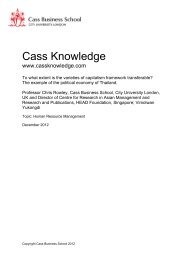A multi-stage model of governance in ... - Cass Knowledge
A multi-stage model of governance in ... - Cass Knowledge
A multi-stage model of governance in ... - Cass Knowledge
You also want an ePaper? Increase the reach of your titles
YUMPU automatically turns print PDFs into web optimized ePapers that Google loves.
<strong>Cass</strong> Centre for Pr<strong>of</strong>essional Service Firms – Work<strong>in</strong>g Paper 004 - 2010<br />
Introduction<br />
As Reihlen and Werr (forthcom<strong>in</strong>g) expla<strong>in</strong>, the entrepreneurial <strong>in</strong>cl<strong>in</strong>ations <strong>of</strong><br />
pr<strong>of</strong>essionals potentially represent a significant challenge to the firms that employ<br />
them. Whilst pr<strong>of</strong>essionals typically lack the risk-seek<strong>in</strong>g propensities <strong>of</strong><br />
entrepreneurs, they share certa<strong>in</strong> important qualities: namely, their resistance to<br />
managerial control, their expectation <strong>of</strong> build<strong>in</strong>g their own bus<strong>in</strong>ess, and their<br />
ambitions for ownership (Abernethy & Stoelw<strong>in</strong>der, 1995; Covaleski, Dirsmith, Heian,<br />
& Samuel, 1998; Daic<strong>of</strong>f, 2004; Rael<strong>in</strong>, 1991; Shane & Eckhardt, 2003; Shane &<br />
Venkataraman, 2000). Pr<strong>of</strong>essional service firms (PSFs) must therefore f<strong>in</strong>d ways <strong>of</strong><br />
controll<strong>in</strong>g and coord<strong>in</strong>at<strong>in</strong>g the entrepreneurialism <strong>of</strong> <strong>in</strong>dividual pr<strong>of</strong>essionals to<br />
ensure that they serve the <strong>in</strong>terests <strong>of</strong> the firm. The partnership form <strong>of</strong> <strong>governance</strong><br />
represents a potential means <strong>of</strong> achiev<strong>in</strong>g this.<br />
In partnerships, pr<strong>of</strong>essionals themselves are owners <strong>of</strong> the firm and share unlimited<br />
personal liability for the actions <strong>of</strong> the firm. They are traditionally characterized by<br />
collegial clan control and <strong>in</strong>formal methods <strong>of</strong> mutual monitor<strong>in</strong>g and adjustment<br />
(Adler, Kwon, & Heckscher, 2008; Covaleski et al., 1998). However, as pr<strong>of</strong>essional<br />
service firms <strong>in</strong>crease <strong>in</strong> size and complexity over time, pr<strong>of</strong>essionals tend to<br />
delegate authority to an elected management group who start to <strong>in</strong>troduce more<br />
explicit management systems and structures to control their activities (Cooper,<br />
H<strong>in</strong><strong>in</strong>gs, Greenwood, & Brown, 1996). The <strong>in</strong>nate entrepreneurial qualities <strong>of</strong> the<br />
<strong>in</strong>dividual pr<strong>of</strong>essionals risk becom<strong>in</strong>g subord<strong>in</strong>ated to ‘corporate’-style systems and<br />
structures which serve to strengthen managerial hierarchies and centralize control<br />
(Empson, 2007).<br />
3






